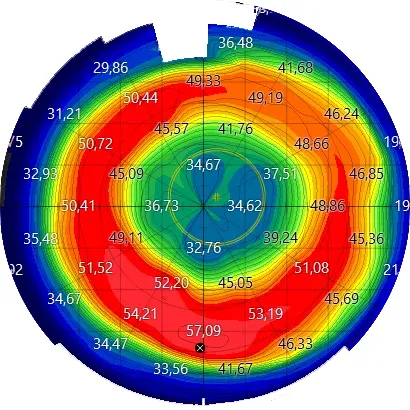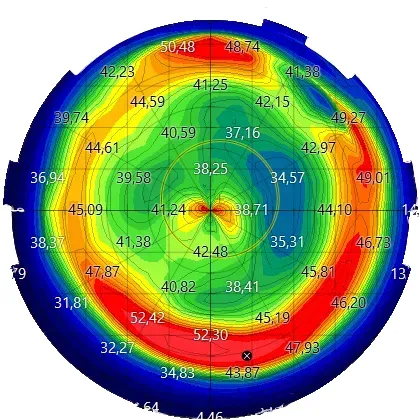STARK (Selective Treatment of Astigmatism in Radial Keratotomy) is a treatment approach developed at the ELZA Institute to address select cases of post-RK corneal instability and irregularity. It combines topography-guided epithelial removal with selective corneal cross-linking (CXL) to modulate corneal curvature in a controlled manner.
Unlike conventional CXL protocols, which apply uniform treatment across the cornea, STARK applies cross-linking selectively, guided by corneal topography and epithelial mapping. This approach aims to:
Introduce subtle topographic changes in the treated area while preserving overall corneal integrity
These principles are particularly relevant in eyes with previous radial keratotomy, where corneal biomechanics are inherently altered and treatment must be applied judiciously.
STARK has been applied in selected patients with a history of RK who presented with irregular corneal topographies and subjective visual disturbances. In these cases, clinicians observed:
It is important to note that these findings are preliminary and patient selection remains a key factor. STARK is not positioned as a generalized therapy for all post-RK patients but as an investigational approach applied in specific clinical contexts.
Three months after the STARK procedure, the center of the cornea is far more homogeneous and, more importantly, is up to 5 D steeper than before. Best corrected vision doubled from 20% with glasses to 40% with glasses. Moreover, it will be easier to fit good contact lenses to achieve even better vision.




The STARK protocol involves:
By selectively modifying curvature, the goal is to reduce irregular astigmatism while limiting disruption of existing corneal architecture.
The STARK protocol represents a focused approach to managing visual disturbances associated with prior radial keratotomy. Through selective cross-linking and careful topographic planning, STARK may offer a means of addressing corneal irregularity and biomechanical instability in a subset of post-RK eyes. Further evaluation and long-term data are necessary to establish its role and limitations within the broader spectrum of post-RK management strategies.
Get in touch
During office hours.
Email us.
Make an appointment, and come to see us.
Thank you for writing a review on google.
Contact us here, we will get in touch with you.
Zoom online consultation for our international patients.
Contact us here, we will get in touch with you.
Contact us here, we will get in touch with you.
Stay informed & get the newsletter
You have successfully joined our subscriber list.
Newsletter abonnieren & informiert bleiben
Sie haben sich erfolgreich in unsere Abonnentenliste eingetragen.
Bitte bestätigen Sie Ihr Abonnement, indem Sie auf den Link in der E-Mail klicken, die wir Ihnen gerade geschickt haben.